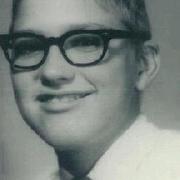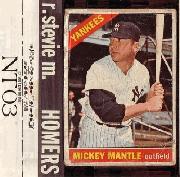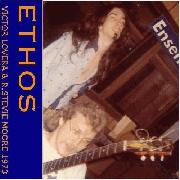|
User
Reviews 83
Approval 96%
Soundoffs 298
News Articles 32
Band Edits + Tags 6,467
Album Edits 11,372
Album Ratings 21919
Objectivity 93%
Last Active 05-28-23 3:22 am
Joined 11-04-15
Review Comments 13,796
| R. Stevie Moore Discography Run
#1 Veteran Progressive Popster, creativity unmatched! The Home Workshop Man. Content over style, always diverse never mediocre. Slays the competition. Thousands of choices. Sub-hipster. Get on it. Get over it^! | | 1 |  | R. Stevie Moore
Children's Museum
1957-59 | NT163 | 2.2 | ↓
Being the son of a session musician, Moore was lucky enough to have access to recording equipment he may not have otherwise. Children's Museum is a collection of family audio recordings using this equipment. And yeah, that's pretty much it. As you travel down this album's runtime, you find yourself on wondrous auditory adventures like hearing a young Stevie say 'apple' or hearing Stevie's dad argue with some woman. The point is, there isn't that much here to latch onto. "Chords", the 27-second-long closer is the closest thing to a recommendation I can give, and that's only because it feels eerily appropriate to have some basic chords lead into the next phase in R. Stevie Moore's career. "Gary" is basically the titular Gary failing to speak, since he's a infant so that's enough to get the boot. While it wouldn't be until 10 years later that we get actual music from Moore, the groundwork for his massive recording output was being laid out right here. | | 2 |  | R. Stevie Moore
On Graycroft
1968-69 | NT01 | 4.6 | ↓
Considered the first true R. Stevie Moore recording by many, including Moore himself, On Graycroft holds a special place in his discography. Here, we get a first taste of Stevie's actual chops as a singer and songwriter. Inspired by the likes of Stan Getz and João Gilberto, On Graycroft is a wonderfully lo-fi foray into soft psych rock and bossa nova. Perhaps I'm blinded by my fervor as a music lover, but there's just something magical about a teenage Moore recording on his dad's tape machine and just nailing it. The best track is "Prayer To A Candle", just a beautifully-somber track only made better by the shaky vox (done by Mike Burroughs). The weakest is "Fugto Hi-School Hijinks", but that's just field recordings of Stevie's school; not a lot there. As a hobbyist music explorer and music lover, I cannot recommend On Graycroft enough. One of home recording's most important documents at best, a damn good album at the very least. Just skip the last track. | | 3 |  | R. Stevie Moore
Grease
1966-69 | NT02 | 3.7 | ↓
Recorded over the span of a few years (some sources say 1967-69), Grease is a collection of songs and audio recordings from Moore's high school years. In contrast to On Graycroft's bossa nova feel, Grease is closer to the Mothers of Invention and other big experimental pop/rock groups of the time. Best track was the absolutely nutzo freak-folk tune "Songtime". Weakest was "Medical Advice", cause I can only stomach so much toilet talk before I tune out. Grease's blend of spoken word and spliced-together music passages doesn't have the immediate appeal of its predecessor, but it has enough personality and youthful energy that I can recommend it. | | 4 |  | R. Stevie Moore
The Sound of Fugto
1966-69 | NT02 | 3.2 | 🆕
Now here's where things get hairy on the chronological front.
See, most of Moore's early work was not released until much later. As time marched forward, more songs began seeing releases sometimes decades after they were originally recorded. Enter The Sound of Fugto, which was recorded around the same time as Grease. But don't expect very many songs, as most of Fugto is spoken word and tape manipulation. The crazy narrative track "The Trip (He Was Nervous)" is my pick for best. Lots of samples, weird plot points, and other interesting bits make it worth the lengthy 12 minute run-time. The weakest has to be "Hippie Party Interviews", which is some interviews and an Adolf Hitler impersonator(?). While The Sound of Fugto did tickle my eardrums a few times, I wouldn't be surprised if someone deemed it an inconsequential piece of the R. Stevie Moore puzzle. An interesting bonus disc for the die-hards only. | | 5 |  | R. Stevie Moore
Unleashed Ignorance (in Bb major augmented)
1968-69 | NT107 | 3.7 | 🆕
The fourth recording completed in 1969, Unleashed Ignorance shares many traits with past entries in the discography. There's plenty of improvised spoken word, piano passages, and samples abound. But what makes this release in particular different is the sheer volume of these elements. While large stretches of past albums had dead space, there isn't any give here: this release demands your attention. Strangely enough, the radio show mock tracks like "WFBR Radio Show" were my favorites out of the lot, even if they were just samples of popular songs. The weakest was the sparse "Midsummer Session". I find myself enjoying these spoken word-type recordings more than I initially thought I would. But I must admit: once you've heard one, you've pretty much heard them all. | | 6 |  | R. Stevie Moore
The Marlborough Sings
1967-69 | NT166 | 3.9 | 🆕
Our final Moore record of the 1960s and it's a doozy. The Marlborough Sings is almost like a compilation of Stevie's first actual steps into music, with covers and originals alike. Now, let's not mince words here: it's mostly a covers record. I could talk all day about how this is a integral piece of Stevie's discography, but at the end of the day it's still mostly a cover album. Mostly full of 60s pop hits no less, death's calling card. But as far as covers go, most of them are pretty tolerable. The real highlights are the originals, "San Bernadino" being the best of them. Sadly, most of these originals are repeats from Grease and On Graycroft. The 'rendition' of the Beatles' "Get Back" is pretty much a joke, but it still counts as a track. While it's mostly covers, Marlborough Sings is definitely one of the more important releases in Stevie's early career. But if you're not a fan of 60s pop-rock covers done lo-fi, maybe skip this. | | 7 |  | R. Stevie Moore / Victor Lovera
Jones
1971 | N/A | 3.8 | 🆕
Jones is the first of many collaborations between R. Stevie Moore and Victor Lovera. In contrast with pretty much everything else in Moore's discography up to this point, this album is entirely folk-tinged pop rock. The duo supposedly met in 1971 and started recording together immediately, so how I'm not sure how much of this is Moore and how much of this is Lovera, but I really loved this. I'm a sucker for acoustic guitar tunes mixed lo-fi and Jones is full of that stuff. The best of which was "People of the Night (Richard Rogers)", what an incredible tune. Worst was "1211". Which one? All of them. I really pondered not even counting these tracks in my final rating (since they're just more spoken word stuff tacked on at the end as a bonus), but hey: they're fair game. Ignore the last 3 tracks and you've got yourself a solid debut by two soon-to-be best friends and collaborators. | | 8 |  | R. Stevie Moore / Victor Lovera
Eenque
1971 | N/A | 4.0 | 🆕
Eenque is the sister album to Jones, and as such shares a lot in common with that album. Even to the point of sharing tracks. But Eenque has mainly original material, so I'd say that anyone that enjoyed Jones should absolutely hear this one directly after because it's even better. "Earth Eulogy" has some really fantastic guitar, vox, and even lyrics; seriously great longer-form song and a solid pick for my favorite. Again, if only those damn "1211" tracks weren't on this, this whole album would be winners. At this point, I really don't need to hear another random convos between Stevie and his crew, as funny as they sometimes are. Aside from those, Eenque is another great collab between the two. Jones/Eenque make me incredibly excited for this collab, since it spans almost an entire decade. It will be interesting to see how their style changes (if it even changes at all) over that long period. | | 9 |  | R. Stevie Moore / Victor Lovera
All Twenty Minutes
1971-72 | NT04 | 3.2 | 🆕
Well that soft rock phase didn't last long, did it?
If it weren't for me already having listened to Herald, Goods., I probably would say that the previous two releases were flukes. However, it seems that All Twenty Minutes is the outlier here. Yes, Moore is no stranger to tape manipulation, but All Twenty Minutes takes it to a new extreme. Lots of guitar, spoken word, random sampling, all that sort of stuff. But I think the time has come to say it: I might finally be a bit tired of it. A bit hard to pick a best track since they all sound the same, but "All Twenty Minutes 4" was probably the best. I will say that I enjoyed "All Twenty Minutes 2" the least, so we'll call it there. Overall, there's some gems to dig through here. Maybe if it were 20 minutes long. | | 10 |  | R. Stevie Moore
Homers
1972 | NT03 | 4.5 | 🆕
Little known fact about me, I actually don't really care about baseball. The music hermit doesn't like sports, bit hard to believe, I know. Does that have anything at all to do with R. Stevie Moore's Homers? Not really. But I can definitively say that I enjoy this album more than I enjoy watching boring ol' baseball. Homers is a collage of electric guitar that's wild for even someone experienced in Moore's shenanigans up to this point. There's so much great stuff here that it's almost overwhelming. My pick for best is the insane "Strike Three", just 4 minutes of guitar madness. The weakest track has to be the short "Sweetspot Sixteen", but it was far from bad or boring; just short. Catchy solos, lo-fi warmth, sudden speed-ups and slow-downs, overdubs, sampling; what more could I ask for? Call this a home run! | | 11 |  | R. Stevie Moore / Victor Lovera
Herald, Goods
1972 | NT115 | 4.3 | ↑
Herald, Goods is probably the best known collaboration by Moore and Lovera, most likely because it was reissued back in 2014. Here, we see the guys going back to the soft rock of Jones and Eenque, which is definitely nice to hear again. There's just something about these albums that hit a perfect balance of kitschy and artful that a lot of big name 70s bands just didn't have. And down in a studio in Nashville, a couple of kids were doing it better than any of 'em. Best track was the quiet "Every Man Deserves the Best", really wonderful pick for a closer. Weakest was the short interlude track "Break Song". While I do think this album is pretty excellent and deserved to be shown to a larger audience through reissuing, I think all of the Lovera stuff should be released in a big, beautiful box set some sunny day. Cause if Herald, Goods is any indication, Moore and Lovera really did make a great team. | | 12 |  | R. Stevie Moore / Victor Lovera
Prethos
1972 | NT139 | 3.8 | 🆕
Prethos is another Moore/Lovera collaboration, collecting material from the Summer-Fall of 1972. As is expected, it's full of simple guitars and slightly-warped vocals, all to the added benefit of some decent songwriting and lyric-craft (courtesy of Lovera). The name Prethos refers to how this is before Moore and Lovera had formed their band Ethos, so these are technically "acoustic demos" (though I would hesitate to say that). Honestly, I don't know how well these songs would work spruced-up with pop rock production, but perhaps we'll see (?). The best track was the rockin' "My Time", and the weakest was the closer "Ung Ung Ung". While it's not the best of their recordings together, Prethos does serve as a good teaser of what's to come. But knowing my taste, there's also the chance these "demos" outshine the re-recordings. Again, perhaps we'll see. | | 13 |  | R. Stevie Moore
Mere Static / Planet 81
1973 | NT05 | 2.5 | 🆕
Mere Static / Planet 81 is described by Moore as the "crippled son" of All Twenty Minutes, and there is a lot to unpack with that description alone. First off, we yet again dive into the world of sound collage and random snippets of gibberish similar to what's found on All Twenty Minutes (hence the son). And the crippled part (I assume) refers to this being a bit rude to stare at for too long, lest his father comes at you for looking down on his boy. Just speculation. "Six" was my favorite of the bunch, as it contained a rendition of the Beatles tune "She's Leaving Home" (one of my favorites by them) with new, stranger lyrics. But by the time "P81 5" rolled around, I was about ready to pack it up. Mere Static / Planet 81 just doesn't have the same intrigue Stevie's earlier experiments had. Not horrible, just unnecessary. | | 14 |  | R. Stevie Moore
Ob Newschk
1973 | NT68 | 3.2 | 🆕
(This review also includes Ahem in 4-Part Section, because I forgot to add it to the database.)
Yet another set of tape experiments by Moore (and Lovera), I was ready to write Ob Newschk off. At first, that is. When I actually got around to listening to it, I was surprised to find that I enjoyed more parts of this one. Most likely because there seems to be a bit of structure here that other Moore experiments tend to lack. Is it always successful? Not really. The best track is another damn cover of "She's Leaving Home", this time called "Ahem 5". This time, Moore redoes the lyrics with allusions to masturbation and other nonsense. Apparently Moore likes "She's Leaving Home" just as much as I do. Weakest was the tedious "Protestician / Ethosymposium", cause god it's long. While a bit more focused, Ob Newschk just barely catches my ear enough to warrant a decent grade. Definitely not for everyone. | | 15 |  | R. Stevie Moore
Invites Comparison
1973 | NT06 | 4.7 | 🆕
"Compiled" in December of 1973, Invites Comparison is the jump to songwriting that I had been waiting for. For most of his previous solo releases, Moore (and to an extent, I) was content with his tape-distorting experiments and strange recordings from his life. With this release, most of that is put to the wayside in favor of straightforward power pop goodness. And I'm all the more glad for it, cause this is one of his best releases yet. The best track was the slow, strange faux-country ditty "The Ghost Of Stringbean". Weakest was "Mine Ear's Plaza", which is about 20 minutes shy of being a higher-tier Sun Kil Moon track. When I started this Discography Run, it was to find lo-fi goodness exactly like this. No comparison needed, this is a knockout. | | 16 |  | R. Stevie Moore
NUN2 (Innuendos)
1973 | NT07 | 3.8 | 🆕
Dipping his toes into long-form "jam band-style" rock, NUN2 (Innuendos) has more in common with an experiment than a true R. Stevie Moore album. Sure, I adore (and overrate) stuff like this constantly so I knew that I'd like it immediately. And Moore is definitely qualified, having a very open love of experimental rock from an early age. On NUN2 (Innuendos), the music jumps from brash to quiet, from melodic to discordant; all with that distinctly messy Moore flair. The best example of this was the opener, "Meat Shortage", a wild ride from start to finish. "Ham Boogy" was a bit underwhelming in comparison to the rest, but still okay. Overall, NUN2 (Innuendos) isn't Moore's strongest outing, but it does see him try and perfect the balance between experimental and accessible. And for most of this album, he succeeds. | | 17 |  | R. Stevie Moore
Monotheism / Atheism / Iconoclasm
1973 | NT08 / NT09 | 3.0 | 🆕
Have you ever wanted to hear 2 hours of improvised piano? Do you like watching paint dry? Well, do I have the album for you!
Monotheism / Atheism / Iconoclasm is a collection of 49 (yes, 49) tracks of Moore riffing on the piano. Or synthesizer. Or whatever else he had lying around. Point is, it's mostly just piano. And as much as I like the piano, listening to over 2 hours of just piano is not exactly what I look for these days. "Movement 27" is strangely entrancing for just chords. But other than those brief glimpses of interest, most of the album is like "Movement 3": kind of boring and too short. While the "watching paint dry" comment may seem a bit too harsh given my rating, you'd be hard-pressed to find a more fitting soundtrack for doing so than Monotheism / Atheism / Iconoclasm. Take that as you will. | | 18 |  | R. Stevie Moore / Victor Lovera
Ethos
1973 | NT 89 | 4.0 | 🆕
Ethos 1 & 2 (or just Ethos as it's labelled here) is another Lovera collaboration and the more I hear from this guy, the more I believe these two are musical soulmates. Ethos is jammin' collection of 30 folk/pop rock jams from the duo that reeks of bedroom recording and experimentation. Though, I guess the proper description would be "apartment recording" or something like that but I'll concede. The best track is definitely "Love Graph", a hard rock (almost proto-punk) tune that almost sounds like a lost Suburban Lawns song. Odd. Weakest was pleasant, but kinda dull "Loving Little Beggar From Hempstead". Ethos is more like a demo compilation than a true album, and I doubt this was ever meant to be released properly. Better late than never, cause this is another hidden gem. | | 19 |  | R. Stevie Moore / Victor Lovera
Studio Ethos
1973 | NT 139 | 3.9 | 🆕
Studio Ethos is just as the name implies: studio recorded versions of tracks by the group. Most of these are repeats from Ethos, but they're different enough that it warrants discussing. The most noticeable change is the production (of course), which is actually pretty good for an independent album from 1973. My favorite was the slow-burn classic pop rock tune "I've Been Here Before", which would've been an excellent closer for this. However, the album instead ends with 20 minutes of filler in the form of radio ads, rehearsal takes (which I actually kind of liked), and Lovera complaining that Moore doesn't sing with enough feeling. Still, I prefer these tracks to what we would get in earlier albums (just random nonsense). I guess "June 14, 1972" would be my pick for least favorite track. If you're turned off by more lo-fi recording styles, then I'd definitely recommend this. Just stop at track 10 (maybe track 12 if you're up to it). | | 20 |  | R. Stevie Moore
Next
1974 | NT 10 | 4.0 | 🆕
For Moore's (supposedly) first release of 1974, we have the 24-track behemoth Next. A collection of more straightforward pop rock songs, Next is definitely has a lot more in common with the more experimental side of 70s pop than most of his other work thus far. It also features a ton of original Moore compositions and is almost entirely performed by the man himself (with some help, of course). And quite honestly, this has some of his most focused work to date. But don't let that fool you: this is still pretty out there for independent rock in 1974. Best track was the hard-rock-esque "New Yorkus," and the weakest was the interlude track "Danny Newbury." Next almost feels ahead of its time in the ways it exaggerates the popular sounds of the 70s, and this is one well that Moore would consistently come back to for most of his career. | | 21 |  | R. Stevie Moore
Apologies to Mr. Gottlieb
1974 | NT 14 | 3.0 | 🆕
Well, this is embarrassing.
If anyone from the future is reading this (doubt it), there is about a year gap between the last entry and this. Why? I don't know. Laziness, album-art-pocalypse of 2019, priorities, life; take your pick. But whatever, I'm back at it and I'm committed to finishing this. At least, I hope. Well, this is a good change of pace for me, as I haven't heard very much R. Stevie Moore since 2019. And man, Apologies to Mr. Gottlieb was exactly the kind of weirdo, freak-out rock I've been missing. Half spoken word nonsense/home recordings, half 70s pop rock aping. Feels more messy and unfocused than Next, which is supposedly a companion piece with this album. Best track was the title track, "Apologies to Mr. Gottlieb." Weakest was... any of the home recordings. Maybe "Sidepocket." Maybe not the best Moore has to offer, but I'm sure glad to be back. | | 22 |  | R. Stevie Moore
Often
1974-75 | NT 11 | 4.4 | →
Here it is. This was actually the album that got me thinking about doing this list. I suppose it was for the best I took a year off from this list, cause it's given me a chance to see if this holds up. And for the most part it does. This is one of the great early Moore releases, overflowing with lo-fi pop goodness. A lot of Moore's mythos hinges on him being the "godfather of modern home recording." And Often is a classic example of why that is. Best song has got to be the pop track "Hey! Pretty Girl." Weakest is the fairly tame folk number "Johna's Theme." Let's hope we see this R. Stevie Moore more often. | |
SandwichBubble
03.22.19 | Listed in semi-chronological order. About time I went through this discog. |
|
